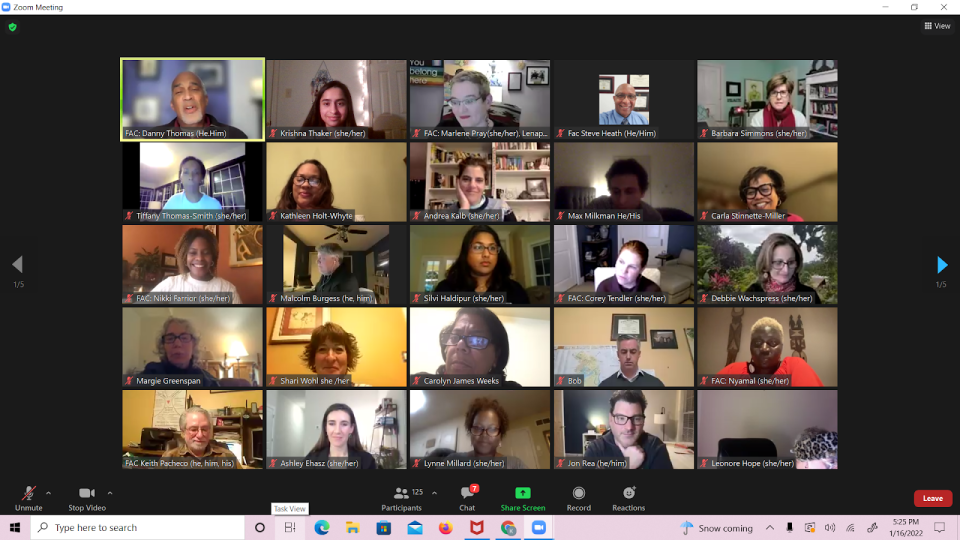Teens address racism, microaggressions and social justice at annual MLK summit
- Oops!Something went wrong.Please try again later.
Students, educators and parents gathered virtually Sunday to honor the Rev. Dr. Martin Luther King Jr. during the 10th annual MLK Peace and Social Justice Summit, hosted by The Peace Center.
In separate breakout rooms, participants gathered to watch a student-led video detailing their experiences with microaggressions and verbal assaults at school and throughout their communities.
A microaggression is a verbal or written action or incident regarded as an instance of indirect, subtle, or unintentional discrimination against members of a marginalized group such as a racial or ethnic minority.
One non-binary individual relayed their experience having to miss class waiting for a turn in the gender neutral bathroom at school. Another explained how they were bullied and talked about after coming out as bisexual.

Other students talked about being teased and put down for being minorities, and that members of their school community constantly made false, negative assumptions about their religions and economic status.
It is extremely difficult to put oneself out there like this, for everyone to see and hear. These students from around Bucks and Montgomery counties displayed tremendous courage in sharing their stories.
After viewing the video, three larger groups were broken down into smaller breakout rooms to have focused discussions about the injustices students face and how we, as a society, can move forward. The importance of allyship, in which a person of privilege seeks to stand with a marginalized group, committing to the active, consistent practice of unlearning and reevaluating, was underscored.
Students discussed this concept of allyship and concluded that one great way to be an ally is to disarm microaggressions by not giving them power when said in conversation.
Participants were then asked to reflect on any microaggressions they have faced and how they may have made them feel. Was there anything someone could have done to be an ally in that moment?
When witnessing a similar microaggression, the answer to this question is often an effective way to be an ally. In the words of Dr. King, “In the end we will remember the words of our enemies, but the silence of our friends.”
In the student breakout room I attended, we discussed the idea of intent versus impact. We noted the importance of being thoughtful with our words, recognizing when we are wrong, and making apologies when the impact of our words did not match the intent.
We talked about how when someone offers us feedback or attempts to educate us in a kind manner, this is a display of trust. The lack of defensiveness on both sides breaks down barriers and opens the floor for open and honest conversation.
During our discussion, a student noted that “education is important.” When we do not know, we must fight our egos and ask, not assume. She remarked that this is “how we can be kind and understanding towards one another.”
As our Zoom conference came back as a full group of almost 150 students, educators, and parents, we further discussed both education and kindness.
To wrap up this event, we reflected on Dr. Martin Luther King Jr.’s wishes. When shown a picture of his family, King wanted people to see his family as a family with faces full of smiles and laughter, and not through a color-blind lens.
In fact, being “color blind” is a microaggression. As humans, it is our job to respect each other, value each other, and learn from each other — no matter what.
Moving forward, we must remember to stay hopeful, and to realize that positive change will happen when we all work together.
As part of the planning committee for this summit, it was heart-warming to see such a large turnout at this conference. I am grateful for The Peace Center, their partners, our event planners and facilitators, technology experts, and each and every parent, student, and educator who made this summit the best event it could be.
I feel empowered and I know there is huge strength in numbers when it comes to fighting injustice.
Change starts small. Change starts with a positive attitude. At the end of the day, we must all follow the Golden Rule.
As King said, “Our lives begin to end the day we become silent about the things that matter.”
Krishna Thaker is a senior at Pennsbury High School and a member of this news organization's Teen Takes panel.
This article originally appeared on Bucks County Courier Times: Teens address racism, social justice at annual MLK summit

